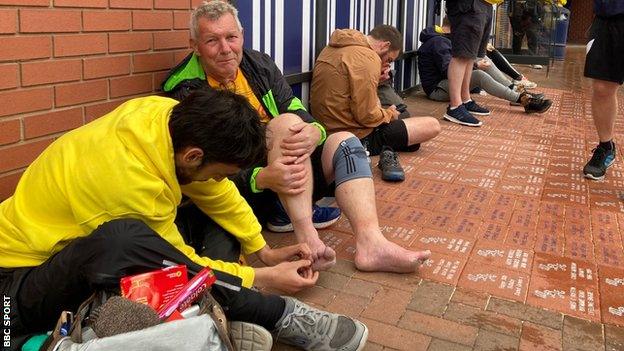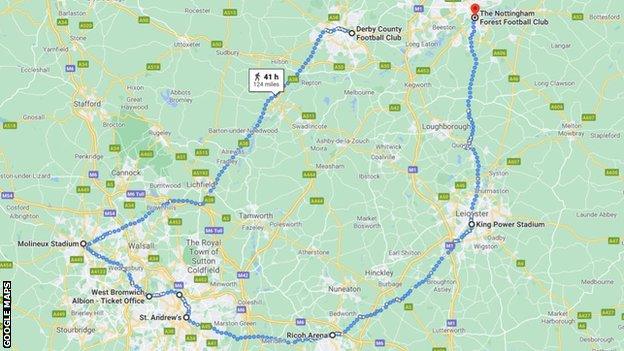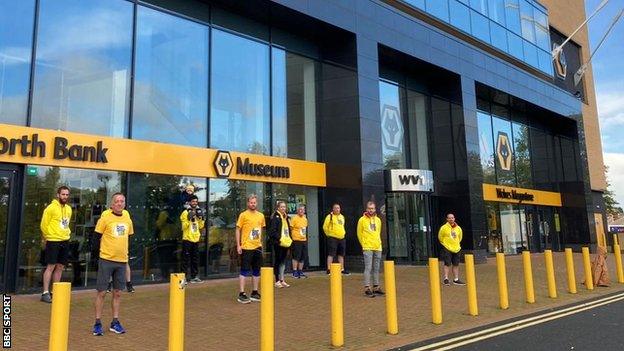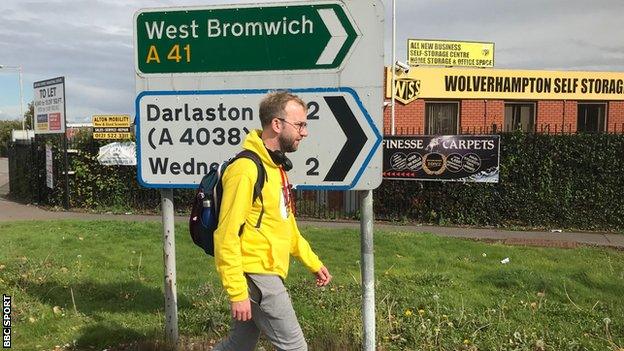Gambling & football: Eight clubs, 130 miles & a mission to end sponsorship 'blind spot'
- Published

Steve Ramsey gets his feet repaired at The Hawthorns
At the peak of his addiction, Steve Ramsey was placing 500 bets on football a day.
"It was the in-play betting that did me over," he says, shortly after leaving Wolverhampton Wanderers' Molineux ground on a 130-mile walk this week to highlight football's relationship with gambling.
"I'd set my alarm for 6am and by one minute past six, I'd had my first bet on a match in New Zealand. You basically just follow the sun, so I would start by betting on matches in New Zealand, Asia, Europe and then across to America and Brazil."
That led to Ramsey stealing over £192,000 from his employers at Warwickshire County Council over a four-year period to fund his habit. In 2017, he walked into a police station and admitted his crime.
He was sentenced to 27 months in prison, but after spending 10 months inside, he has not had a bet for more than three years.
The 54-year old is one of a dozen former gamblers taking part in the Big Step - a gruelling five-day trek through the Midlands to visit eight clubs who have 15 gambling partners between them.
According to organiser James Grimes, the aim of the walk is to highlight how football clubs have helped normalise betting by featuring adverts on shirts and in stadiums.
Three-quarters of Premier League teams have betting sponsors or partners, with that figure rising to 87% in the Championship.
Both the Premier League and the English Football League (EFL), which is sponsored by Sky Bet, say their clubs comply with regulations. The EFL added that its "mutually beneficial" relationship with the gambling industry was conducted in a "responsible manner".

The approximate route the Big Step took from Derby County to Nottingham Forest in five days
"I wanted to go to jail because it was my fault," Ramsey says. "But when the betting firm were forced to pay £76,000 of my debt because they hadn't done any checks and were depositing money in my account, it was the first time I thought, am I the only one to blame for this?"
Grimes, who became addicted to football betting as a teenager, says fans are becoming more aware of the harm associated with gambling. Several of those on the walk, including Ramsey, contemplated suicide and it is a chance to share their stories.
"I've never had to win anybody over," Grimes says along the busy A41 to West Bromwich Albion. "The fact is most people, especially football fans, aren't happy to have a gambling sponsor on their shirt."
He set up a petition calling for the end of gambling sponsorship in football, following on from a House of Lords report in July which recommended similar reform.
But the Betting and Gaming Council says "betting provides sport with the vital funding it needs" and claims the introduction of a whistle-to-whistle ban has reduced the number of betting adverts seen by young people during live games on TV.
The Gambling Commission, the industry's regulatory body, says the debate is "timely" before an upcoming review of the 2005 UK Gambling Act.
"They did it with tobacco advertising in Formula 1, so why not for gambling in football?" asks Ramsey, who is feeling the effects of a 34-mile stint on day one, which started at Derby County.
'Walking pain nothing compared to mental anguish of gambling'

The Big Step started day two at Wolverhampton Wanderers
If a five-day hike between football clubs sounds like a fun way to visit new stadiums, it is also a gruelling test for those involved.
When BBC Sport spoke to the group at Molineux on day two - a 14-mile stint which would also take in The Hawthorns before finishing at Aston Villa - there were already hobbling participants and running repairs to injured feet.
By the time the group make it to West Brom's ground, Ramsey's feet are in bits. "This is going to be the hardest three and a half miles of my life," he says while en route to Villa Park.
"But it's absolutely nothing compared to some of the stuff that's gone before. The mental anguish that you can never express properly - getting up every morning knowing your life is in complete turmoil but nobody knows about it. Gambling can be so hidden."
'Football can do so much better'

Former gambler Ryan Pitcher en route to West Bromwich Albion
As the group head down the hill past Handsworth Park, the finish line is not far away and spirits are up. The socially distanced walk during the ongoing coronavirus pandemic is almost a means of escape.
"Doing these walks is humbling," says Grimes. "We have been joined by people who have been to the brink and then put themselves through this for our cause. I get quite emotional because you go back to remembering the dark days and how different life is now."
This is the third Big Step Grimes has organised, but Covid-19 has made it more difficult for several reasons.
In addition to ensuring the group remain socially distanced, clubs have been less willing to discuss the subject at stadiums because of lockdown measures.
There are also more ethical challenges. Football has its own financial troubles, making it harder to persuade clubs facing job losses they should drop gambling sponsors.
"It's a new argument that we've faced because of Covid-19," says Grimes. "But I have little sympathy with football as a whole, because it's an entirely unsustainable business model for small clubs to survive.
"It's not the big clubs who are reliant on gambling money, it's the smaller ones. But that reliance isn't healthy and the money comes from people like us who are on this walk, who have attempted suicide and who are in hundreds of thousands of pounds of debt.
"Football doesn't have to be the problem, it can be the solution - as it is for many things in the community. But it has this one blind spot with gambling and we have to keep chipping away. It can do so much better."
If you've been affected by issues in this article, there is information and support available on BBC Action Line, and via this BBC page.

Cancel Culture: Has it gone too far?
Video Games: The industries problem with inclusion
